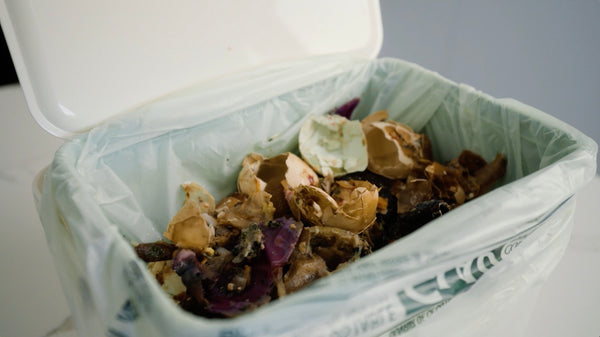When it comes to managing kitchen waste, two popular options stand out: Sepura and countertop compost bins. While both aim to streamline food scrap disposal, they employ fundamentally different approaches. In this guide, we'll explore the distinct workings of Sepura and countertop compost bins. Understanding their differences can help you make an informed choice for your kitchen.
Sepura and countertop compost bins differ primarily in their mechanisms of handling food waste. Sepura revolutionizes the process by allowing all food scraps to be washed down your sink while it collects them in a compost bin and only allows liquids to flow down the drain. On the other hand, countertop compost bins provide a manual solution for collecting food scraps, requiring each dish to be scraped into the bin before washing.
|
Sepura
|
Countertop Compost
|
|
Automatic compost collection & easier dishwashing
|
Manually scrape each dish off into bin before washing dishes
|
|
Sealed bin with air intakes and carbon filter
|
Lid usually doesn't seal, often has a carbon filter but still leaks odor
|
|
Liquid drains to keep food scraps dry
|
Food scraps sit in liquid
|
|
Empty every 2-4 weeks
|
Requires weekly emptying
|
How Sepura Works
Sepura operates on an ingenious system that maximizes the benefits of composting while minimizing the drawbacks. Here's a breakdown of how Sepura works:
Scrape and Press: Start by washing your food scraps off your dishes into the sink, just as you would with a garbage disposal. Then, press the wireless button on Sepura.
Separation Process: Sepura completely separates liquid from food scraps before sending them to the compost bin. Having your scraps sit in a dry compost bin slows the decomposition process and reduces odor.
Liquid Flow: While solids are collected in the compost bin, only liquids drain through your plumbing. This prevents food clogs and makes Sepura perfect for homes with older pipes or homes on septic.
Indicator System: Sepura is equipped with LED indicators that notify you when it's time to empty the bin. When the compost bin is full Sepura only allows liquids to drain and won’t send food to the bin until it’s emptied to stop overflow.
Sepura emerges as the ideal solution for individuals seeking convenient composting, and a plumbing and septic-friendly garbage disposal alternative. It simplifies kitchen cleanup and makes sustainability seamless in your kitchen cleanup routine.

When Sepura is the Best Choice:
Keeping Food Out of Pipes: If you prefer to keep food out of your pipes to avoid potential clogs and damage, Sepura is the best food disposal for you. This is especially true in older homes, homes on septic, or areas where garbage disposals aren’t allowed due to plumbing concerns.
Eliminate Odor: If you're sensitive to kitchen odors, Sepura is for you. Its sealed and liquid-free compost bin, controlled air intakes, and carbon filter neutralize food scrap smells, keeping fruit flies away and your kitchen fresh.
Infrequent Emptying: Sepura holds 2-4 weeks worth of food scraps in its compost bin. Emptying your compost is not a weekly chore.
Clean and Easy Composting: Instead of scraping every dish into the compost bin before washing your dishes, you wash all your food scraps down your sink. This streamlines kitchen cleanup and helps the environment. Each Sepura diverts over 3000 pounds of methane, this is equivalent to powering five homes for a year!
Low Maintenance: The food separator in Sepura is self-cleaning, no maintenance is required. When you use your sink tap that will rinse the tiny bits of food so they will be collected in your compost bin when Sepura is activated. The compost bin is stick-free and allows food scraps to slide out easily when emptying in a curbside or backyard compost, and works with compost bags for even easier cleanup.
Limited Countertop Space: Sepura sits under your sink, keeping your kitchen countertops tidy and clutter-free. This is especially helpful if you don’t have much countertop space, or like to minimize the amount of appliances on your counter.

How a Countertop Compost Bin Works
In contrast to Sepura, a countertop compost bin operates on a manual collection mechanism:
Manual Food Collection: Food scraps are manually collected in a designated bin kept on your countertop. Each dish needs to be scraped into the compost, where liquids sit with your food scraps.
Frequent Emptying: Most countertop compost bins need to be emptied weekly, or more frequently depending on the odor emitted. Like Sepura, the compost bin can be emptied into a curbside or backyard compost.
Ongoing Maintenance: The compost bin needs to be cleaned regularly both on the interior and exterior of the bin to reduce odors and mess.

When a Countertop Compost Bin is the Best Fit:
Limited Under-Sink Space: In kitchens with extremely limited under-sink space, a compact countertop compost bin may be a more practical option compared to larger composting systems.
Preference for Manual Control: Some individuals prefer hands-on control over the composting process, and a countertop bin provides this level of involvement.
Budget-Friendly Composting: Countertop compost bins have a lower upfront cost compared to high-tech solutions like Sepura.
Conclusion
The choice between Sepura and a countertop compost bin hinges on your priorities. Sepura excels in septic-friendly food disposal, keeping food odor-free, and quiet food scrap disposal, making it an excellent choice for modern kitchens. Countertop compost bins, while effective, come with their own set of considerations, including the need for manual management and frequent maintenance. Understanding the workings of both options empowers you to make a decision that aligns with your kitchen needs.


